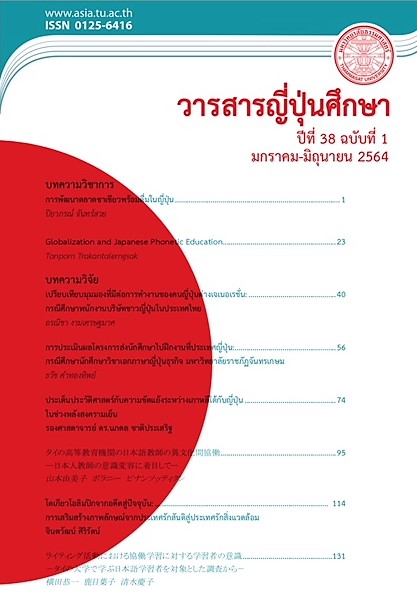ประเด็นประวัติศาสตร์กับความขัดแย้งระหว่างเกาหลีใต้กับญี่ปุ่นในช่วงหลังครามเย็น
คำสำคัญ:
ประวัติศาสตรฺ์, เกาหลีใต้, ญีปุ่น, สงครามเย็นบทคัดย่อ
บทความวิจัยนี้[1] ประสงค์ที่จะศึกษาความขัดแย้งระหว่างสาธารณรัฐเกาหลีกับญี่ปุ่นในช่วงหลังสงครามเย็น ความขัดแย้งดังกล่าวเป็นปัญหาเชิงโครงสร้างที่สำคัญประการหนึ่งนับตั้งแต่หลังสงครามโลกครั้งที่ 2 เป็นต้นมาจนถึงปัจจุบัน อย่างไรก็ตาม ในช่วงสงครามเย็นนั้นการที่ทั้งสองประเทศให้ความสำคัญกับการเผชิญหน้ากับการคุกคามของโลกสังคมนิยมคอมมิวนิสต์ โดยร่วมมืออย่างใกล้ชิดกับสหรัฐอเมริกาทำให้ประเด็นความขัดแย้งต่างๆ ที่ทั้งสองประเทศมีต่อกันไม่ได้รับการเน้นย้ำหรือถูกมองข้ามไปใน
ช่วงดังกล่าว
ความขัดแย้งซึ่งเกี่ยวเนื่องมาจากประเด็นทางประวัติศาสตร์ที่เกิดขึ้นในช่วงสงครามเย็นที่พอจะเห็นเป็นรูปธรรม ได้แก่ ความขัดแย้งเรื่องดินแดนและทรัพย์สินต่างๆ รวมทั้งความเสียหายที่เกิดจากช่วงที่ญี่ปุ่นยึดครองเกาหลีใต้ ซึ่งมีการเจรจากันอย่างเข้มข้นในช่วงก่อนเปิดความสถาปนาความสัมพันธ์ทางการทูตระหว่างกันใน ค.ศ. 1965 นอกจากนั้น การแสดงออกของผู้ที่มีบทบาททางการเมืองโดยการเดินทางไปเยือนศาลเจ้ายะสุคุนิได้ก่อให้เกิดความบาดหมางระหว่างทั้งสองประเทศเป็นครั้งคราว
[1] บทความวิจัยนี้เป็นผลมาจากการวิจัยเรื่อง” ความขัดแย้งระหว่างสาธารณรัฐเกาหลีกับญี่ปุ่นในช่วง ค.ศ. 1945 – 2020 ” (พ.ศ. 2564)
Downloads
เอกสารอ้างอิง
สถาบันเอเชียศึกษา จุฬาลงกรณ์มหาวิทยาลัย, 2549.
Bae Chinsoo. “Territorial Issue in the Context of Colonial History and International Politics: the Dokdo Issue between Korea and Japan” Journal of East Asian Affairs, Vol. 26, No. 1 (Spring/Summer 2012).
Barnds, William J., Editor. The Two Koreas in East Asian Affairs. New York:
New York University Press, 1976
Bean, R. Mark. Cooperative Security in Northeast Asia: A China-Japan-South Korea Coalition Approach. Washington, D.C.: National Defense University, 1990.
Bridges, Brian. Japan and Korea in the 1990s: From Antagonism to Adjustment. Basingstoke, England: Macmillan, 1997.
Cha, Victor D. Alignment Despite Antagonism: the United States-Korea-Japan Security Triangle. Stanford, California: Stanford University Press, 1999.
Chunghee Sarah Soh, “The Korean "Comfort Women": Movement for Redress” Asian Survey, Vol. 36, No. 12 (Dec., 1996).
Dudden, Alexis. Troubled Apologies among Japan, Korea, and the United States. New York: Columbia University Press, 2008.
Gregor, Anthony James and Chang, Maria Hsia. The Iron Triangle: A U.S. Security Policy for Northeast Asia. Stanford, California: Hoover Institution Press, Stanford University, 1984.
Kim Hong-nack. “Korean-Japanese Relations under the Roh Moo-hyun Government,
2003-2007” Korea and World Affairs, winter 2007.
Kimura Kan, “Why Are the Issues of ‘Historical Perception’ between Japan and South Korea Persisting”. Journal of International Cooperation Studies. Vol. 19, No. 1, (2011, 7).
Lee, Chong-Sik. Japan and Korea: The Political Dimension. Stanford, California: Hoover Institution Press, 1985.
Lee Myon-woo. “Textbook Conflicts and Korea-Japan Relations” Journal of East Asian Affairs, Vol. 15, No. 2 (Fall/Winter 2001).
Marley, James W. Japan and Korea: American’s Allies in the Pacific. Westport, Connecticut: Greenwood Press Publishers, 1981.
Pollmann Mina. (2015, April 8). Why Japan’s Textbook Controversy Is Getting Worse. The Diplomat. https://thediplomat.com/2015/04/why-japans-textbook-controversy-is-getting-worse/ สืบค้นเมื่อ 15 มกราคม 2564.
Shibuichi, Daiki. “The Yasukuni Shrine Dispute and the Politics of Identity in Japan: Why All the Fuss?” Asian Survey, Vol. 45, No. 2 (March/April 2005).
Yoon Tae-ryong. “Learning to Cooperate not to Cooperate: Bargaining for the 1965 Korea-Japan Normalization”, Asian Perspective, Vol.32, No.2, 2008.




